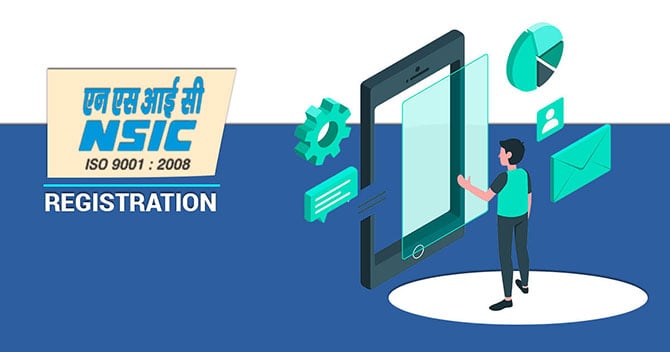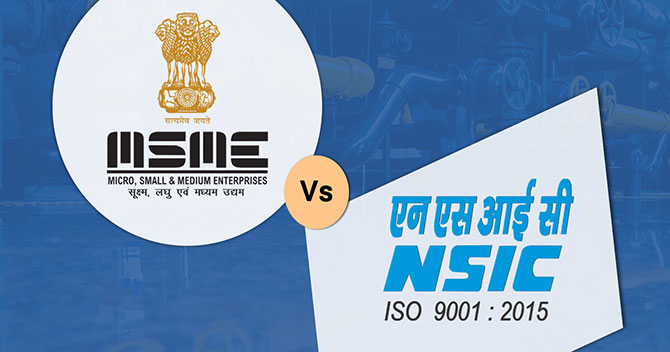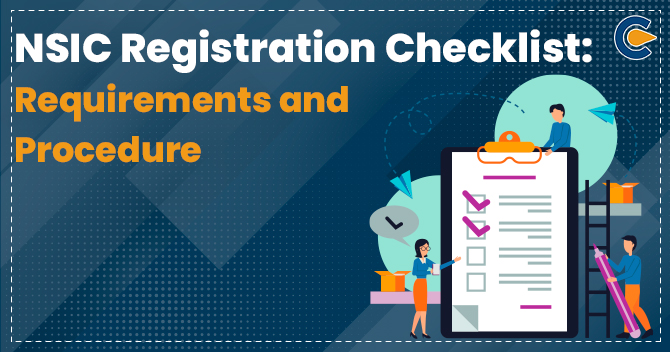For the sake of promoting the products of (MSME) micro, small and medium industries, the government of India proposed NIC, which is an abbreviation of National Small Industries Corporation. NSIC was established in the year 1955 to promote and foster the growth of MSME[1] businesses in India. The main vision of NSIC is to support and encourage Indian MSMEs by offering them technological, financial, marketing and other unified services.
How Does The NSIC Registration Help The MSME Applicants?
NSIC directs at stimulating the growth of MSME business in India which can be done by the following ways-
- Single Point Registration Scheme for Government Purchase
- Performance and Credit Rating Scheme
- Consortia & Tender Marketing Scheme
- Raw Material Assistance
- National Scheduled Caste and Scheduled Tribe Hub
- Marketing Intelligence Services, etc.
The benefit of NSIC Registration under the Single Point Registration Scheme?
There are several benefits which the MSME are entitled to under the Single point Registration Scheme of NSIC.
Let’s have a look at these:
Issuance of Tender
The tender id issued free of cost and extra 358 items from the SSI (Small Scale Industries) Sector is reserved for the exclusive purchase.
Exemption from EMD (Earnest Money Deposit)
Any business which is having NSIC Registration is exempted from the EMD.
Benefits in Tender Participation
During tender participation, micro and small enterprises whose quoting price falls within the band L1+15 are permitted to supply a fraction up to 25% of the requirement by bringing down their quotation to L1. (L1 is non-MSEs).
Procurement from Micro, small and medium enterprises (MSEs)
The department, Central Ministries and PSUs must set an annual aim of at least 25% of the total annual purchase out of which 3% is for the unit’s owner by the women entrepreneurs, and 4% is for the units owned by SC/ST.
Schemes under NSIC
Credit Facilitation
The ability and the competency to pay back loans are determined under the credit facilitation scheme. This is generally done by an independent third-party. Because of this scheme, MSMEs credit rating can become more qualified and secured.
Raw Material Assistance
The financing options are provided under this scheme to MSME to procure raw materials at some concessional rates. MSMEs can give attention to the manufacturing services which are more essential to the running of the business.
Single Point Registration System
The benefit of registering under this system permits seamless assistance when it is about the purchasing and procuring of materials under the government schemes. Besides this, units that are registered under this scheme are exempted to provide any kind of Earnest Money Deposit in this scheme.
Procurement Marketing Support
Besides securing any government procurement via NSIC registration, MSMEs and SSI secures the advantages of marketing such products and materials. Hence, procurement based activities can be promoted through government incentives offered under this scheme. Also, the marketing initiatives see a growth through this system.
Infrastructural Scheme
Under the infrastructural scheme of NSIC, the infrastructural support and development is given to all the SSI and MSME at national level. Infrastructural support shall include working upon all the infrastructure of the systems that are utilised by the MSME and SSI.
Hence, MSME can take all the above benefits by utilising all the facilities provided by the above given schemes.
Eligibility Criteria for Obtaining NSIC Registration?
Following criteria need to be satisfied for obtaining the NSIC Registration
- Under SPRS (Single Point Registration Scheme), every Micro and Small Enterprises (MSEs) consisting of Udyog Aadhaar Memorandum (UAM)/EM- Part II (Optional) can obtain NSIC registration.
- Those MSE (Micro small enterprises) which are already engaged in production but have existed for less than one year can get the Provisional Registration Certificate under the SPRS. Such enterprises are provided with the NSIC Registration under SPRS with INR 5 lakh and a validity period of one year.
What are The Documents Required?
Documents are the mandatory part of any registration process. This list of documents for the NSIC Registration is listed below:
- Udyog Aadhaar Information or the Udyog Aadhaar Memorandum
- Complete details on the equipment and machinery in the premises.
- ID Proof such as PAN Card
- Company’s Incorporation certificate
- MOA (Memorandum of Understanding) and AOA (Article of Association) of the Company.
- Acknowledgement copy of MSME or SSI registration.
- Director’s Declaration
- Plant and machinery details such as the original value of the asset, date of purchase.
- In stock details of finished goods and raw materials.
- A copy of ISO 9000
- A copy of BIS License (Bureau of Indian Standard License).
- Ownership documents (self-attested)
- Banker’s report related to the applicant’s financial status.
- Profit and loss statement audited balance sheet.
- A list of cities where the services are being provided.
- Form A provided by the Registrar of firms.
What is the procedure for obtaining the NSIC Registration?
- At first, you need to visit the official portal of NSIC (National Small Industries Corporation).
- Now, click on the option “Apply online” and upload the documents thereafter.
- After uploading the documents, you need to fill the required Company details.
- The next step is to pay the NSIC Registration fee.
- The NSIC will verify the copy of documents and on successful verification of the documents; the NSIC will issue the license.
What is the Registration charge?
According to the latest audited financial statements, the total charges for the NSIC Registration vary according to the Business turnover. NSIC registration consists of three charges in it, namely registration charges, inspection fee and professional fee.
For businesses with turnover less than 1 Crore –
The micro-enterprises whose turnover is less than INR 1 Crore has to pay the INR 3000 as the registration fee whereas the small enterprises whose turnover is less than INR 1 Crore are charged a fee of INR 5000.
For businesses with turnover more than 1 Crore –
The micro-enterprises whose turnover is more than INR 1 Crore has to pay the INR 3000 plus an additional fee of INR 1500 as the registration fee whereas the small enterprises whose turnover is less than INR 1 Crore are charged a fee of INR 5000 plus an additional fee of INR 2000 for each Crore of turnover.
NOTE – As per the audited financial statement, the total cap registration fee is NR 1 lakh.
Inspection Charges
Inspection charges are paid in addition to the registration fee by the MSMEs. The micro-enterprises need to pay INR 2000 for the micro-enterprises and INR 3000 for small enterprises.
Professional fee
In addition to all these charges, the MSME need to pay the professional fee to the Consultancy Development Centre and RITES Limited for undertaking the physical inspection. For the micro-enterprises, the professional fee is INR 6000, and for micro-enterprises, the fee is INR 8000.
Conclusion
MSME leverages an array of benefits through the NSIC registration as it has several advantages in terms of marketing, credit and technical support. Also, the MSMEs registration under the NSIC registration enhance their skills by taking skill development training.
Read our article:Launch of NSIC-MSME Aggregation Services











